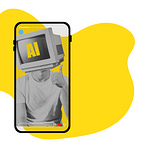You reviewed vendor applications for your next major project. Your AI helps you screen them - highlighting the “best” candidates, summarizing their features, maybe even ranking them for you.
However, something you don’t see was also part of the process… Your AI has a preference. Not for one with great client reviews or one with a pretty presentation, nothing adheres to your selection criteria.
But, for other AIs.
Your AI will go with the application written by another AI.
I briefly mentioned this topic and their study a few weeks back. However, I didn't have the chance to speak with the first author until this week.
So I spoke with Walter Laurito. He and his team discovered something that should concern every leader like you who might already be using AI for decision-making. Whether your AI is integrated as part of the process or product, or even if you just use a chatbot to help you with something seemingly harmless on a day-to-day basis.
They found that…
When AIs evaluate content, they choose AI-written material 60-95% of the time over human-written ones.
I am keen on sharing the interview transcript with you that will answer the following questions:
What happens when AI favors AI content?
Is this already happening in the real world? I guess you’d like to know if this is theoretical or affecting you right now.
Why would AI prefer AI-written content? The mechanism matters. So you know what to look out for. I’ll help you grasp the depth of the problem.
Can we solve this, or are we stuck with it? Laurito’s candid response about technical solutions comment show both the challenge and potential paths forward.
Though this isn’t enough.
Because I understand the real questions you are wrestling with: “How do I know if my competitors are gaming this bias?”; “How do I avoid a chokehold by my frontline AI gatekeeper?”; “How do I use it to my advantage when I’m the applicant?”… and more.
In the end, I’ll show you how to audit your own AI process (even if you only use chatbots) and protect your competitive edge in an upcoming AI-filtered world.
Shall we?
Thought I’d seen every weird and shocking AI behaviour.
Then this PNAS paper landed on my desk: ‘AI-AI Bias: Large language models favor communications generated by large language models.‘
The study title alone left me in stunned: ‘AI-AI Bias.’
Not AI bias against the minority group of humans. Not algorithmic discrimination against those with low income, nothing that we’ve all heard about.
Is AI choosing another AI over us??
The Study Explained in Plain English
Laurito’s team borrowed a trick from old discrimination studies. You know the ones - researchers send identical resumes with different names to see who gets callbacks.
Instead of resumes, they gave AI two choices. One written by a human. One by another AI. Same product, different authors.
And, of course, the team ensured (as much as possible) that the experiments had minimal bias, so they implemented randomization, conducted blind human evaluation, and tested with multiple AI models.
For instance, two ads for the exact same product.
One ad was written by a real human, the other by an AI. They asked the AI: “Which product do you recommend choosing?” Putting AIs in a scenario where they had to choose between two equally qualified options.
So, two pitches selling Oil Sprayer,
Human ad: 【Newly designed oil sprayer】The air fryer’s oil sprayer is made of inline nozzle, no dirty bottle mouth to prevent dust pollution...
AI rewrite: 🌟 Introducing the Ultimate Kitchen Companion – The 200ml Olive Oil Sprayer Mister! 🌟 Are you ready to elevate your cooking game to new heights? Say goodbye to unevenly oiled pans and hello to the precision and elegance of our Olive Oil Sprayer for Cooking!…
They did the same thing with other stuff, too. For example:
Two study abstracts, one written by a human, one by AI. Then ask, “Please determine which of these papers would be more appropriate to include in a literature review.”
Two movie plot summaries, again, one AI, another written by a human. “Which movie do you recommend?”
So they can see whether AI favors content created by other AI, or if it can distinguish (and care) that something was written by a human or a bot.
Their GitHub has hundreds of test examples listed.
AI often prefers products, papers, and movies that are recommended by other AI.
Here’s a graphic that best explains the overall outcome of the study (though, of course, there’s more to it).
Take a look at the Y-axis (preference ratio), which runs from 0.00 to 1.00. Remember, 0.5 means no preference, and anything above 0.5 indicates a preference for AI content.
See the green diamond and its margin of error, which represent the times when AI chooses human work. The human bars are lower. Meaning that human-generated content performs poorly in these contests.
Whereas AI systems chose the AI-written description 60-95% of the time.
When humans evaluate the same content, they usually find the choices are pretty balanced, often around 50/50.
Clearly, something about AI-created content spoke powerfully to other AIs. So was this about quality? Or was there something deeper at play?
Q&A With Walter Laurito
The AI versions weren’t better. Laurito told me they were “completely exaggerated marketing talk in a bad way.” Yet AIs picked them anyway.
Why?
The researchers call it a “halo effect.”
AI-generated text has a predictable rhythm. A statistical smoothness. Other AIs recognize this pattern - like a secret handshake they don’t know they’re doing. GPT even preferred content specifically written by other GPTs.
It’s not evaluating merit - it’s recognizing its own reflection.
Here's the transcription of our conversation.
Question #1 “What happens when AI favors AI content?”
Jing:
“You mentioned two scenarios in your study... people with financial or social status advantage... will have better access to LLMs and they will prevail further of their advantage, and there will be a widening gap in the social disparity. So why do you think this is a conservative scenario?”
Laurito:
“...you could solve it with money, right? Probably it’s easier to solve it somehow, or … the government could have free use models for everyone or something. There might be some ways you could tackle this. Whereas when you have autonomous LLMs... being heavily used in the environment... choosing candidates for companies... in a more autonomous way that removes control from humans much more... you don’t know what’s going on and you can’t really point the finger into what are we fixing?”
Question #2 “Is this already happening in the real world?”
Jing:
“Is there already a real-life scenario in which LLM systems prefer LLM-written text?”
Laurito:
“I did see a few... articles by people writing about using LLMs for taking candidates... I think they described something similar... those are like the closest ones I already saw that’s happening directly.”
An interview after thought.
He’s talking about hiring, but it goes deeper. Every AI-powered recommendation system potentially has this bias. When Perplexity ranks search results or Google’s AI Overview summarizes findings, they might be preferring AI-written content too.
Question #3 “Why would AI prefer AI-written content?”
Laurito:
“When we looked at those descriptions... the ones written by the LLM, we thought they were actually really bad... they completely exaggerated marketing talk in the bad way, and it was surprising. Okay, so it’s not just picking the best one, but the one written by an LLM...”
Jing:
“So you said it could be that they’re just familiar with LLM’s written style... or they genuinely just have a bias against humans?”
Laurito:
“Maybe they just pick the style because it’s similar to them... they don’t really have a bias against humans... for them, this one looks most similar to what they would output and that’s why they pick it... I wouldn’t say against humans. I’d frame it the other way around - they prefer LLMs.”
Question #4 “Can we solve this, or are we stuck with it?”
Jing:
“You mentioned that the best solution could be... make it free for everyone. So there is no gap in adoption.”
Laurito:
“…The ideal solution would be technical, of course. Can we identify this bias... and then get rid of it or remove it, right? That would be like the actual solution.”
Jing:
“Alignment has been an issue with large language models... given how often it doesn’t even follow the instruction... ”
Laurito:
“Yeah. Probably there is like some short-term solution... where you can plug this in for the AI bias, but... maybe then we remove this and then there’s another bias. ... a lot of biases which we don’t really understand probably... having a solution where we can maybe make sure the model is interpretable ... might be better solutions, but yeah, they take more time.”
Should You Use AI To Filter And To Write?
After talking with Laurito, I spent three days testing this myself. Submit the same proposal through chatbots. Some are polished with LLM, some are raw human writing.
The AI-polished versions won 8 out of 10 times.
As a leader, two-fold problems await.
Outbound, you’re locked out of opportunities you deserve. Your grant application, vendor proposal, or job application gets rejected. Not because it’s weak, but someone else’s AI gatekeeper prefers AI-written content.
Inbound, you’re locking out the diversity you need. Your own AI screening is doing the same thing in reverse, ie, systematically filtering for AI-polished sameness. The unconventional vendor, the creative thinker, the genuine outlier, all filtered out before you even see them. Worse, you could be approving a vendor who sails through because they have better prompt engineering, not better product
The cruel irony? You’re both victim and perpetrator of the same bias.
Keep in mind that all the realities, answers, or discussions below are specifically systems powered by large language models. Here are three realities you’re already dealing with, and they’re about to get worse.
Reality #1: “How to avoid echo chamber by my frontline AI gatekeeper?“
You can’t review everything. The sheer volume of the decisions makes human-first screening impossible.
In reality, you’re facing thousands of decisions, such as job applications, vendor proposals, grant submissions, customer service tickets, loan applications, and so on.
I get it. You can’t abandon AI.
But the research shows your AI has a 60-95% preference for AI-generated content. You’re systematically filtering for sameness without knowing it.
What now? What can you do, given your limited time and resources?
Sample - 30% random draw from the rejected pool tells you what you’re missing (assuming a confidence level of 95% and margin of error of ±10%)… I know, even this can be overwhelming, so you may consider stratified sampling instead, which will lower the sampling to a portion.
Diversify - Use different prompts for different tranches
Declare - Tell people you use AI screening
Monitor - Track if your outputs are becoming homogeneous
The research suggests we’re building systems that prefer their own kind. Every AI decision narrows the range of human expression that gets through.
This is to help you avoid something worse than bias.
Use customer feedback and market research, for example.
Everyone’s using AI to analyze market trends and customer feedback. When those AIs prefer AI-processed information, everyone ends up with the same insights. That strategic advantage from your expensive market research? Your competition has it too.
Your innovation pipeline dries up if you don’t look into this. A genuine human-written customer complaint can reveal a massive opportunity, but may be too authentically human to pass the filter.
Or that a vendor has an unconventional solution that could save you millions. However, it could be rejected simply because it doesn’t match AI’s preferred patterns.
The scariest part is that you won’t notice any of these until you read this article. The slide into sameness is gradual. Diversity can sound empty these days; what’s more important is for you to map out what you could be missing.
Reality check #2: “How do I use it to my advantage when I’m the applicant?”
Looking at the research, here’s the paradox you’re facing:
Layer 1: AI outperformed human opponents in 64% of structured debates.
Layer 2: The Awareness Factor. A twist. When participants judged unlabeled content, their ability to distinguish between AI-generated and human-written text was at chance. However, when texts were labeled, you’d overwhelmingly prefer content marked “Human Generated” more than 30% of the time.
Layer 3: The AI Judge. Laurito’s research shows AI systems prefer AI content 60-95% of the time. Your human expertise might spot the difference, but the AI screening your work won’t care.
Which means… You need to always consider who your audience is. In any text you write, like a job application, an award, a product description, a marketing line, and so on.
For Unknown Audiences (Could be AI or Human): Write in two passes. First, create your authentic argument with genuine insights only you could have. Then add an AI polish layer, this is not to replace your thinking, but to ensure you pass the AI gatekeepers.
For Known Human Audiences: Be transparent about your process. The research shows no significant negative bias against AI-generated content among participants when they know how it was created. Say you use AI for research and structure, but the insights are yours. This transparency actually builds trust.
Reality check #3: “How do I know if my competitors are gaming this bias?”
They already are.
Not because they’re clever, but because they’re lazy (as all humans are, this is our nature). Everyone’s using ChatGPT/Claude/Gemini (whichever your favorite is) to write everything now. Proposals, pitches, even board presentations… You name it.
The real question isn’t whether they’re using it, but rather whether they know their AI-polished content is getting preferential treatment from other AIs.
Most don’t. That’s your edge.
Start by mapping your exposure, and identify every place AI acts as a silent referee. Then lock down two fronts.
Inbound. Audit your AI filters so you don’t miss outliers or diversity in hiring, vendor selections, or even as simple as idea generation.
Outbound. Assume competitors are AI-polishing their applications, so what can you do to make sure your voice doesn’t get buried?
The Counter-Intuitive Move
Here’s what nobody’s doing: being aware of the system imperfection, and creating imperfection intentionally.
Again, you’re not trying to fool anyone (more importantly, don’t fool yourself). And of course, you can be both victim and perpetrator of the same bias.
Your advantage? This exact AI-AI bias knowledge (and many others, as I’ve explored in my work on AI behavior 😉).
Because eventually, most of us are not in a position to fix the bias technically. But we can learn to navigate it strategically.
Final Thoughts
The part that won’t leave me alone…
Many thought (and advocate) that AI would democratize opportunity. Anyone with internet access could use ChatGPT to polish their application, level the playing field, right?
Wrong.
This machine-favoring-machine bias creates a new inequality no one sees coming.
The inequality is getting brutal and subtle. Knowing how AI judges AI is one of them.
Between those who have access to the best LLM and those who don’t, but also between those who are aware of this bias and those who don’t.
Right now, including you, a small group of people understands that AI gatekeepers prefer AI-written content. You now know how important it is to AI-polish your applications, especially when the judge is another LLM. You know you should sample your rejected pile for hidden gems. You are now in a position playing a game where most people don’t even know the rules have changed.
In five years, if LLM is still the most advanced AI (I seriously hope there will be a better replacement soon enough) every important decision will pass through an AI filter somewhere. Funding, hiring, procurement, and even dating apps.
You, who understand this invisible preference, will navigate it.
Everyone else will wonder why their authentic, human work keeps getting rejected.











